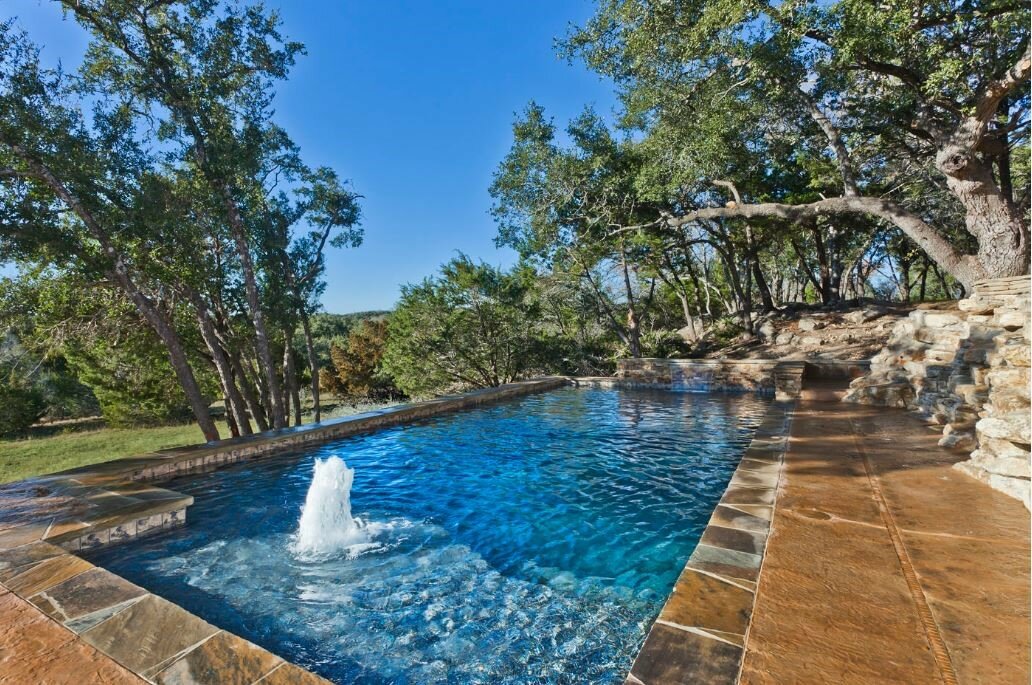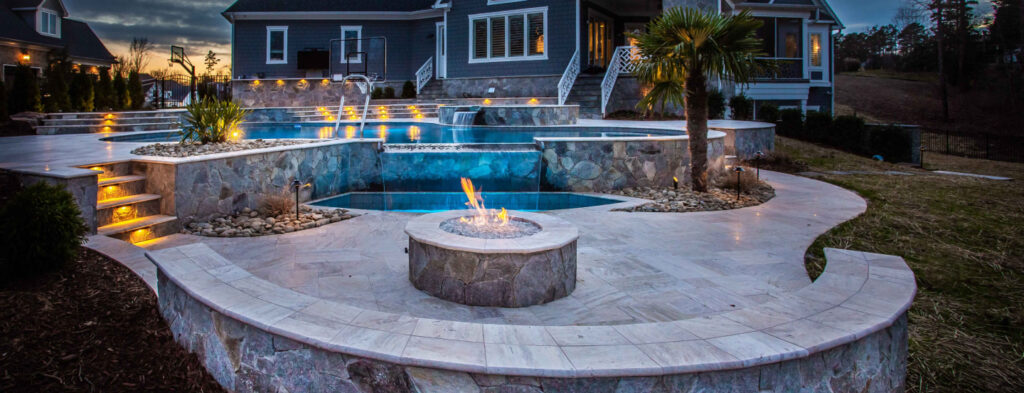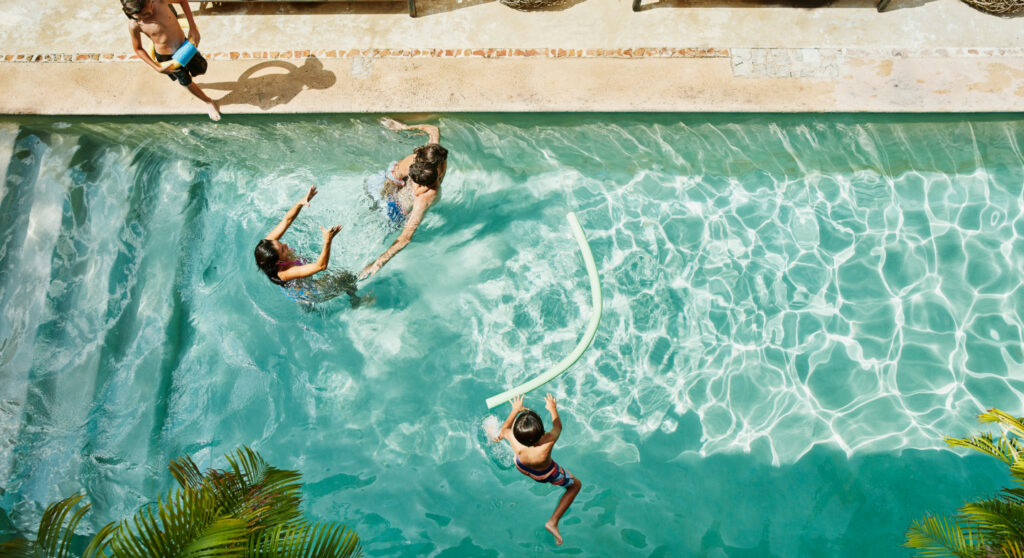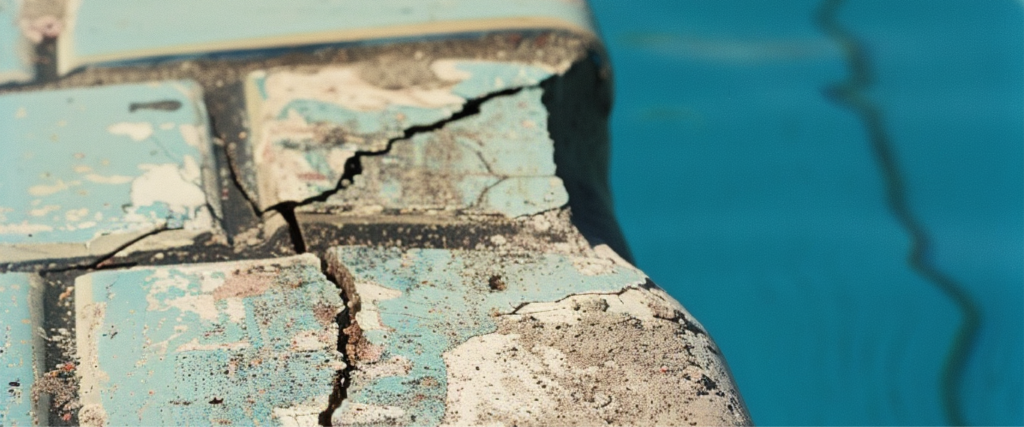To estimate how much it costs to build a pool in Georgia, consider the factors that affect installation and ongoing expenses.
1. Type of pool material
The material you choose for your inground pool is one of the biggest factors that will impact your overall cost. Pools are typically made from one of three materials: concrete, fiberglass, or vinyl. Each has its own set of benefits and challenges, which can influence the price. Here’s a breakdown of each type of pool material:
Concrete Pools
Concrete pools, also known as gunite, are the most popular choice for many Georgia homeowners due to their durability and ability to be customized into any shape or style. They are made from a mixture of sand, cement, and water, providing strength and versatility. While concrete pools tend to have a higher upfront cost, they offer long-term value with lifespans of 50-100 years. If you have a larger budget to work with, a concrete pool is a great investment. It’s the most customizable option, allowing for unique water features, custom tiling, and special designs.
Fiberglass Pools
Fiberglass pools are manufactured in a controlled facility and shipped as a single piece to the installation site. However, customization options are limited since they come in pre-molded shapes and sizes. With a lifespan of around 25 years, fiberglass pools offer a balance of convenience, durability, and similar pricing to concrete pools.
Vinyl Pools
Vinyl pools are the most budget-friendly inground pool option and are built on-site, avoiding the shipping costs associated with fiberglass pools. They feature a steel or polymer frame lined with a vinyl liner. However, while the initial investment is lower, homeowners should factor in long-term maintenance, as vinyl liners require periodic replacement. The liner is more susceptible to punctures and wear compared to other pool materials, typically needing replacement every ten years, which can add up.
2. Size and Depth of the Pool
The size and depth of your pool play a significant role in determining the overall cost. Larger and deeper pools require more materials, labor, and excavation, all of which can drive up expenses. In the Atlanta area, backyard pools are typically 12 by 24 feet and 5 to 8 feet deep, and the cost of pool installation can range anywhere from $50 to $150 per square foot or more. If you have kids, a shallower pool may make more sense, but if you plan on having add-on features like jump boards you’ll need a deeper pool.
3. Leveling and Excavation
Before construction can begin, the condition of your backyard’s terrain must be taken into account. In Atlanta, properties with uneven elevations or sloped terrain — common in some neighborhoods — may require additional leveling, which can add to the cost. Excavation costs will also be higher if there are obstacles like trees, rocks, or plumbing that need to be removed or relocated. Additionally, Georgia’s red clay soil can make excavation more challenging, requiring extra reinforcement and specialized equipment. Soil testing is often conducted to ensure the ground is suitable for a pool and to provide a more accurate cost estimate.
At Anthony & Sylvan Pools Atlanta, we have the experience and expertise to navigate these challenges, ensuring that your pool is built efficiently and with the highest quality standards, no matter the terrain.
4. Pool Features
The beauty of building your own concrete pool is selecting the features and finishes you desire to make it 100% yours. Customization does come with a cost, but these features can greatly improve the functionality and enjoyment of your pool. In Georgia, a major trend in pool construction is incorporating natural elements. Homeowners are increasingly designing pools that blend with their surroundings, using materials like natural stones, waterfalls, and vibrant landscaping to create a tranquil, organic atmosphere. Other popular features include tanning ledges for lounging, integrated spas for relaxation, and LED lighting for ambiance and nighttime use. Many Atlantans also favor saltwater systems for lower maintenance and a more natural swimming experience.
5. Pool Maintenance
Beyond the initial construction costs, pool maintenance plays a significant role in the overall expense of owning a pool. The type of pool you choose can impact maintenance requirements, frequency, and cost.
Maintaining a concrete inground pool
- Pool Shell Acid Wash: Concrete surfaces can develop stains over time and may require occasional acid washes, typically costing $450–$600
- Pool Cleaning Service: In Georgia, expect to pay roughly $75 to $150 per month for weekly pool cleaning
- Replastering or Retiling: The pool interior may need attention every 8 to 20 years, costing roughly $6,000-$8,000
- Chemical Usage: Monthly pool chemicals cost around $50-100 to maintain proper water balance
While concrete pools may need more hands-on care, they offer superior durability and can be tailored to specific design preferences — potentially reducing the need for compromises or future modifications.
Maintaining a fiberglass inground pool
- Surface Cleaning: Fiberglass pools require cleaning of any dirt or biofilm buildup like any other pool, with similar monthly maintenance costs
- Repairs: Fiberglass pools typically require gel coat refinishing or crack repairs every 7 to 10 years. Costs can vary widely depending on the issue.
- Chemical Usage: Similar to concrete pools, monthly chemical costs around $50-100
Though often marketed as “low maintenance,” fiberglass pools are not immune to issues—particularly structural ones that can be difficult to fix due to the one-piece shell construction.
Maintaining a vinyl inground pool
- Vinyl Liner Replacement: The liner typically needs to be replaced every 10 years, with replacement costs averaging $4,000 to $10,000 or more
- Chemical Usage: Like other pool types, pool chemicals cost approximately $50-100 per month
- Tear and Puncture Risk: While softer to the touch, vinyl liners can be more vulnerable to sharp objects or rough use, making liner care important.
6. Utilities
Another long-term cost beyond the initial build of your backyard pool is electricity usage. If you choose Anthony & Sylvan Pools, we cover the cost of filling your new pool with water, so you won’t need to worry about the initial water fill charge. After that, however, you’ll need to pay for water to be cycled regularly, which will affect your monthly water bill. Running the pool’s equipment, such as pumps and heaters, will increase your electricity usage, raising your electric bill. Expect an increase of $30 to $150 per month in the Atlanta area, depending on the size of your pool and the equipment used.
7. Permits & Regulations
When building an inground pool in Atlanta, there are various permits and regulations you’ll need to navigate. These typically involve zoning laws, safety requirements, and inspections that vary based on your location and the specifics of your pool. Because these regulations are subject to local ordinances and can fluctuate, the costs and requirements can vary greatly. For this reason, we won’t provide specific numbers, as they can change depending on your area. It’s always a good idea to check with your local builder to get a more accurate understanding of what’s required. If you choose Anthony & Sylvan Pools, we will take care of all the necessary permits and regulatory requirements, helping to streamline the process and ensure everything is in compliance.
8. Taxes and Home Value in Georgia
Curious if a pool adds value to a home in Georgia? Research suggests that adding an inground pool can increase your home value by 5-7% on average. Homes with pools may also be more attractive to potential buyers in areas where outdoor living is valued, potentially leading to a quicker sale or higher sale price. However, adding a pool may also increase your property taxes, as the pool can raise the assessed value of your property. This could result in higher annual property taxes. Additionally, you may be able to receive a tax deduction for the installation and maintenance costs of a pool if it is for medical reasons, though this is a rare situation and requires specific documentation.
9. Insurance
Building a new pool in Atlanta means you’ll need to contact your homeowner’s insurance provider to update your policy. Typically, adding a pool will increase your premiums, but the increase is often minimal — around $50 annually. Your insurance policy may cover damage to the pool, as well as provide liability protection in case of accidents, such as medical bills or lawsuits related to injuries around the pool area. Be sure to discuss the specifics with your insurance provider to ensure you have the right coverage for your new pool.









